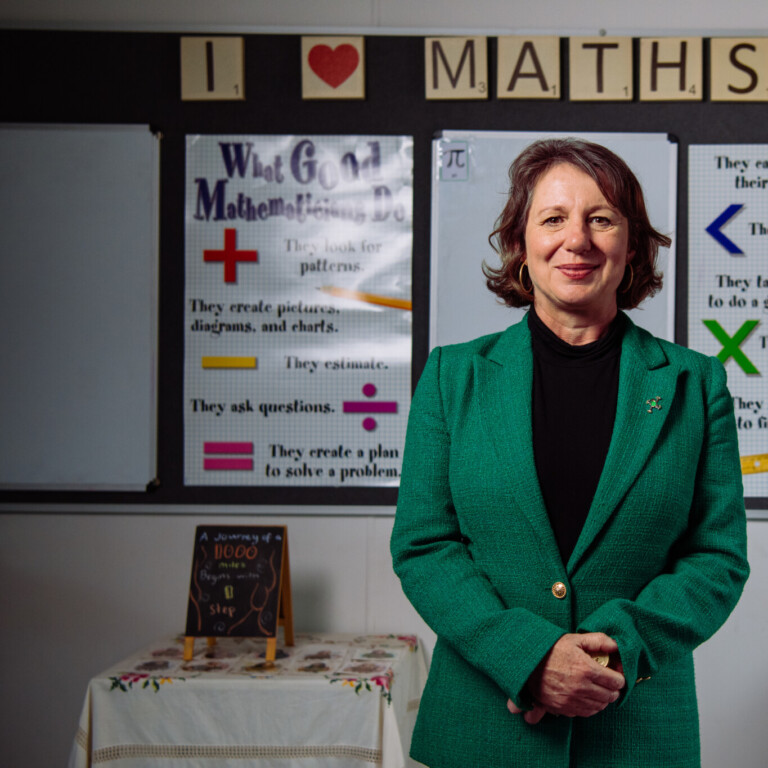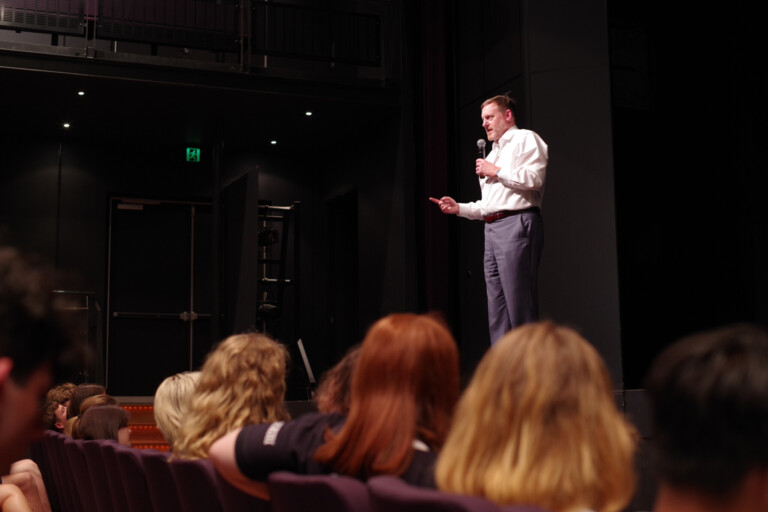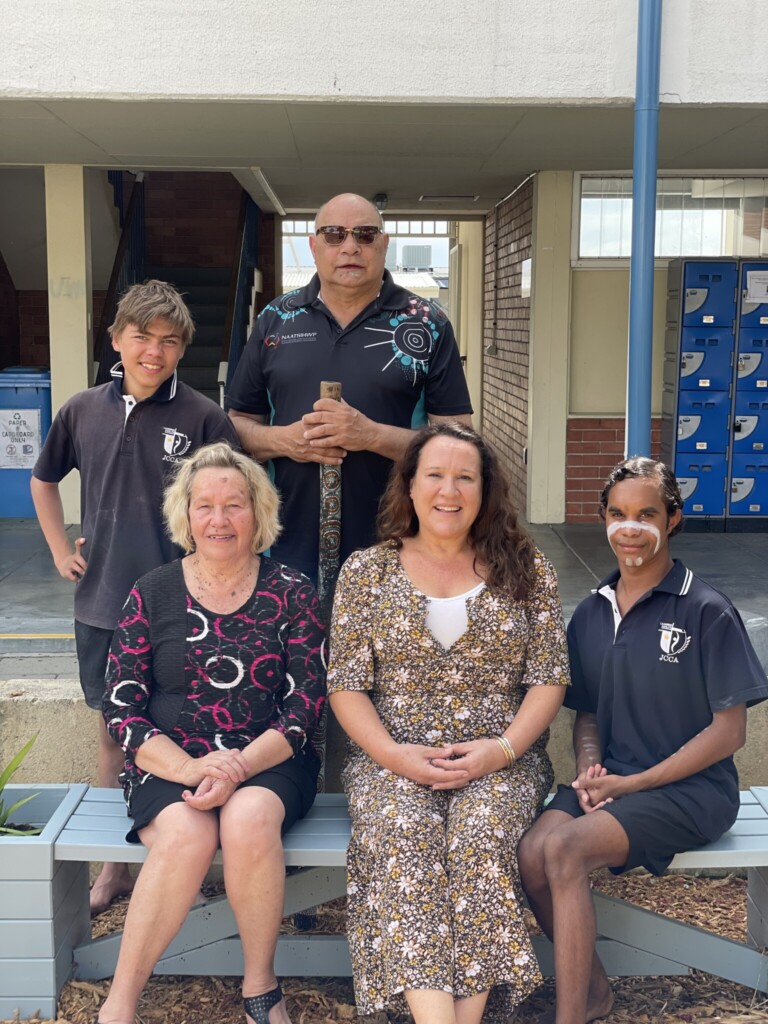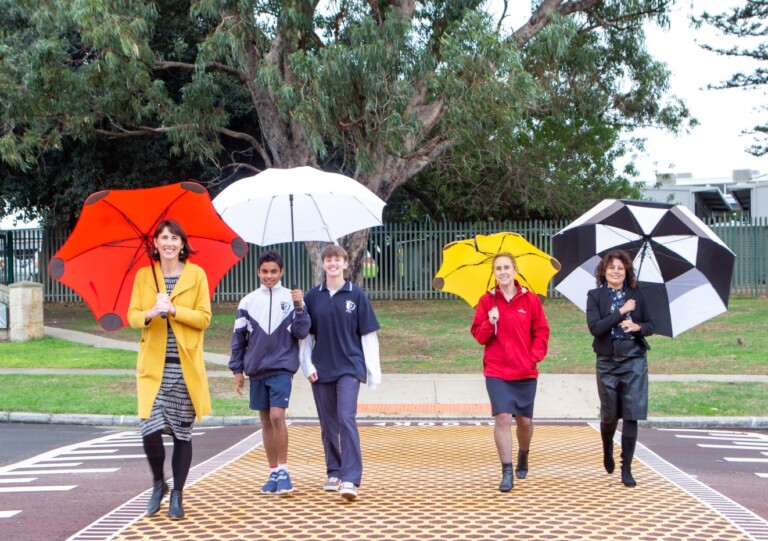The Music Theatre Program combines dance, drama and music to provide students with the skills to create, present and analyse music theatre.
Students receive tuition in a range of theoretical and practical areas including music theory and knowledge, aural perception, history and analysis of the musical genre, various movement styles including jazz, tap and ballet, acting through song, character work and improvisation, and theatrical performance skills.
The program is made up of four curriculum sessions per week. Two sessions are focused on music aural and theory development, and literature. The other two sessions develop performance skills through character and dance.
As part of the Instrumental Music School Services (IMSS) program, music theatre students develop vocal skills through small group voice lessons. These are timetabled on a rotational basis to avoid repeatedly missing the same classroom lesson. Ensemble classes occurring outside the curriculum time consist of vocal and production rehearsals appropriately scheduled in the lead up to performances.
Music theatre students in Years 11 and 12 are offered a course leading to two distinct pathways. One is focused on achieving an ATAR for tertiary admission. This is the Contemporary Music course with a music theatre performance emphasis. The other is the CUA30920 Certificate in Music: Music Theatre course, which continues the music theatre context.
Lower School Program
Our Gifted and Talented Music Theatre Program combines dance, drama and music to provide your child with the skills to create, present and analyse music theatre.
Students receive tuition in a range of theoretical and practical areas including music theory and knowledge, aural perception, history and analysis of the musical genre, movement, character and theatrical performance skills.
The program is made up of four curriculum sessions per week. Two sessions are focused on music aural and theory development, and literature. The other two sessions develop performance skills through drama and dance.
As part of the Instrumental Music School Services (IMSS), music theatre students develop vocal skills through small group voice lessons. These are timetabled on a rotational basis to avoid repeatedly missing the same classroom lesson.
Ensemble classes occurring outside the curriculum time consist of vocal and production rehearsals appropriately scheduled in the lead up to performances. Commitment to extension classes is compulsory and notification about these commitments will be given in advance.
Upper School Program
Music theatre students in Year 11 and 12 are offered a course leading to two distinct pathways. One is focused on achieving an ATAR for tertiary admission. This is the Contemporary Music course with a music theatre performance emphasis. The other is theCUA30920 Certificate in Music: Music Theatre, which continues the music theatre context.
Further details on the music theatre courses can be found in the Year 11 and Year 12 Curriculum Handbooks.
Performances
Performance is an important aspect of this program and your child will take part in at least two compulsory public performances from Year 8 and one in Year 7 over the course of the year. These include cabaret style ensemble productions, junior and complete musicals.
Rehearsal schedules outlining any after school and weekend commitments will be distributed for families to plan around these times. All rehearsals are compulsory learning experiences.
Throughout their time at the College, students may often be invited to perform for various community events.
Dress Requirements
For performance classes, music theatre students are required to wear the following uniform:
Performance classes – girls
• Navy blue leotard
• Black footless tights
• Navy blue jazz shorts
• Black jazz shoes
• Black tap shoes with buckles (not required until Semester 2)
• Character shoes (black leather look) in Years 7-9 and chorus heels in Years 10-12.
Performance classes – boys
• White t-shirt
• Phys-ed shorts
• Black jazz shoes
• Black tap shoes with buckles (not required until Semester 2)
• Character shoes (black leather look)
Professional Artists
All Gifted and Talented music theatre students have the opportunity to work with professional artists, choreographers, teachers and performers.
The skills obtained from guest director workshops, masterclasses and rehearsals are invaluable and instrumental to the development of our students in the music theatre program.
Extension and Acceleration
Reflection
• Excursions to music theatre productions.
• Workshops and masterclasses with industry performers, Western Australian Academy of Performing Arts (WAAPA) graduates, IMSS staff, tutors and professional artists.
Technical development
• Introduction to music theatre specific technology (eg radio microphones and other sound equipment).
• Use of music software for aural perception and compositional skill development.
Performances
• College productions.
• Opportunities that encourage students to demonstrate their work to the wider community.
• Festivals and community events that broaden performance experience.
Ensemble development
• Developing practical skills in song, dance and character.
Curriculum
• Compacted curriculum so students are fast tracked through content that has been mastered. Students work on content one year level above a normal curriculum delivery.
• Students explore a range of broader, deeper and more challenging learning tasks than those that are delivered in a normal educational setting.
• Individual performance programs set at a year level above current year or study.
Please note: This presents an example of what is offered as part of the program.




